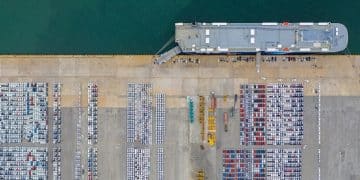US Response to the European Refugee Crisis: Geopolitical and Economic Analysis

Analyzing how the US will respond to the growing refugee crisis in Europe involves examining geopolitical strategies, economic impacts, and humanitarian considerations, amidst shifting global dynamics.
The unfolding refugee crisis in Europe presents a complex challenge, prompting significant questions about how the United States will respond. This article delves into a geopolitical and economic analysis of the potential US approaches, examining the factors that drive these decisions and the implications for both the US and Europe.
Understanding the European Refugee Crisis
The European refugee crisis, which intensified in the mid-2010s, stems from a combination of factors including political instability, armed conflicts, and economic hardships in various regions of the Middle East, Africa, and Asia. Understanding the scale and complexity of this crisis is crucial for analyzing potential US responses.
Root Causes of the Crisis
Several interconnected factors contribute to the ongoing refugee crisis, requiring a multifaceted approach to address the issue effectively.
- Political Instability: Conflicts and political turmoil in countries like Syria, Afghanistan, and Libya have displaced millions, forcing them to seek refuge in safer regions.
- Economic Hardship: Lack of economic opportunities and widespread poverty push many to migrate in search of better living conditions and employment prospects.
- Climate Change: Environmental degradation and climate-related disasters exacerbate existing vulnerabilities, leading to displacement and migration.
These factors, deeply intertwined, create a complex web of challenges for both the refugees and the host countries, highlighting the urgent need for comprehensive solutions.

Geopolitical Implications for the US
The refugee crisis in Europe directly affects US foreign policy and geopolitical strategy. The US has historically played a significant role in international humanitarian efforts and maintaining global stability. The crisis presents both challenges and opportunities for the US to exert its influence and uphold its values.
Strategic Interests
The US response to the refugee crisis aligns with its broader strategic interests in maintaining stability, promoting human rights, and countering terrorism.
The US aims to prevent further destabilization in Europe, which could have far-reaching consequences for global security and trade relationships.
By providing humanitarian assistance, the US can enhance its soft power and strengthen alliances with European nations.
Addressing the root causes of the crisis can help prevent the rise of extremist groups that exploit instability and human suffering.
Economic Considerations for the US
The economic implications of the refugee crisis are significant for both Europe and the US. While the immediate focus is on providing aid and support, the long-term economic effects can influence trade, investment, and labor markets.
Trade and Investment
The refugee crisis can impact trade and investment flows between the US and Europe, as increased instability and economic strain in Europe may affect business confidence and market dynamics.
Economic aid packages and development initiatives aimed at addressing the crisis can create opportunities for US companies and contractors.
Potential disruptions in European supply chains due to the crisis can have ripple effects on US industries that rely on European inputs.
The influx of refugees into European labor markets can influence wage levels and employment rates, potentially affecting US firms operating in Europe.

Potential US Policy Responses
The US has several policy options for responding to the refugee crisis, ranging from direct financial assistance to diplomatic interventions and resettlement programs. The choice of policy response depends on a range of factors, including political considerations, budgetary constraints, and public opinion.
Financial Assistance
One of the most direct ways the US can assist is through financial contributions to international organizations and aid agencies working on the ground. This aid can support essential services such as food, shelter, medical care, and education for refugees.
Diplomatic Efforts
The US can use its diplomatic influence to promote peace and stability in conflict zones, addressing the root causes of displacement and preventing further refugee flows. This involves working with international partners to mediate disputes, support democratic transitions, and promote good governance.
The Role of International Organizations
International organizations such as the United Nations High Commissioner for Refugees (UNHCR) and the International Organization for Migration (IOM) play a crucial role in managing the refugee crisis. The US works closely with these organizations to coordinate aid efforts and ensure effective responses.
Coordination and Collaboration
Effective management of the refugee crisis requires close coordination and collaboration among various stakeholders, including governments, international organizations, NGOs, and local communities.
- UNHCR: Provides protection and assistance to refugees, asylum seekers, and internally displaced persons worldwide.
- IOM: Works to promote orderly and humane migration management, assisting governments in addressing migration challenges.
- NGOs: Implement programs on the ground, providing essential services and advocacy for refugees and migrants.
These organizations leverage their expertise and resources to address the diverse needs of refugees and promote sustainable solutions.
Challenges and Considerations
The US response to the refugee crisis faces several challenges and considerations, including political opposition, budgetary constraints, and security concerns. Overcoming these obstacles requires a balanced approach that takes into account both humanitarian values and national interests.
Domestic Politics
Domestic political considerations can significantly influence the US response to the refugee crisis, as public opinion and partisan divisions can shape policy decisions and resource allocations.
- Public Opinion: Concerns about the economic and social impacts of accepting refugees can fuel opposition to resettlement programs.
- Partisan Divisions: Differing views on immigration and foreign policy can lead to gridlock and hinder effective responses.
- Security Concerns: Fears about terrorism and national security can result in stricter screening procedures and restrictions on refugee admissions.
Navigating these challenges requires transparent communication, evidence-based policymaking, and bipartisan cooperation.
| Key Aspect | Brief Description |
|---|---|
| 🌍 Geopolitical Impact | US involvement affects global stability and alliances. |
| 💰 Economic Role | Aid packages and trade relations are influenced. |
| 🤝 Policy Options | Financial aid, diplomacy, and resettlement programs vary. |
| 🛡️ Security Concerns | Balancing humanitarian aid with national security is critical. |
FAQ
▼
The crisis is driven by conflicts, political instability, economic hardship, and climate change impacts in the Middle East, Africa, and Asia.
▼
US involvement can enhance its soft power, strengthen alliances, and promote stability, influencing its global geopolitical influence.
▼
Trade, investment, aid packages, and labor market dynamics in Europe affect the US economic considerations and strategic policies.
▼
The US utilizes financial aid, diplomatic efforts, and resettlement programs to address and mitigate the effects of the refugee crisis.
▼
Domestic politics, budget constraints, and security concerns present significant challenges that require careful navigation and balanced decision-making.
Conclusion
In conclusion, the US response to the European refugee crisis is a multifaceted endeavor shaped by geopolitical strategies, economic considerations, and humanitarian principles. By understanding the complexities and challenges involved, the US can play a constructive role in addressing this global issue.





